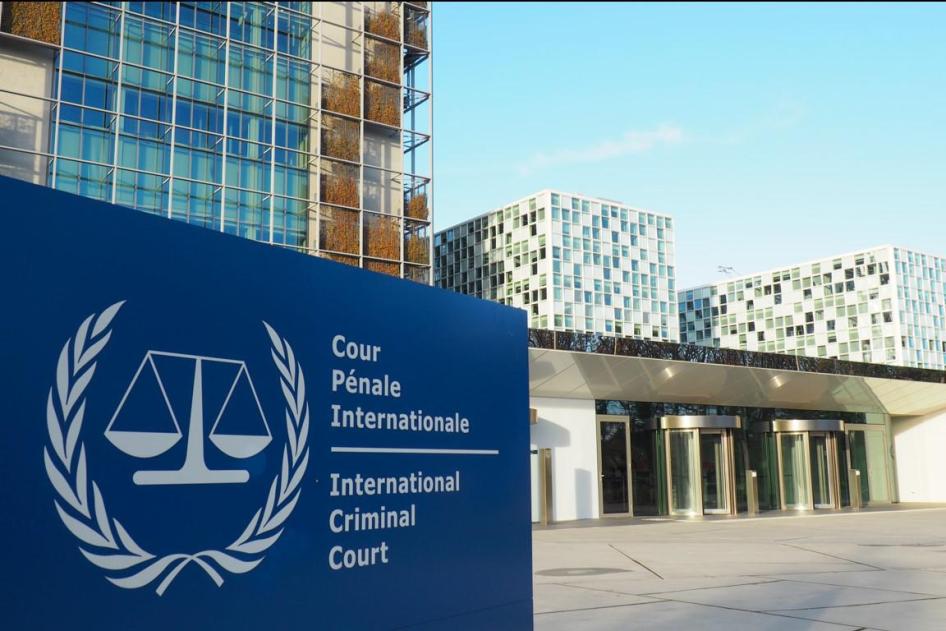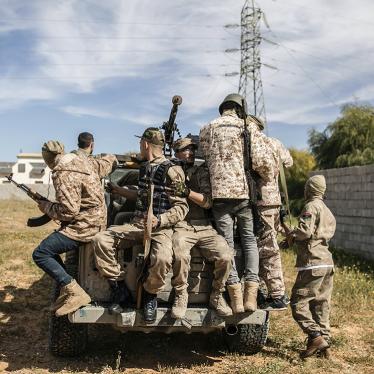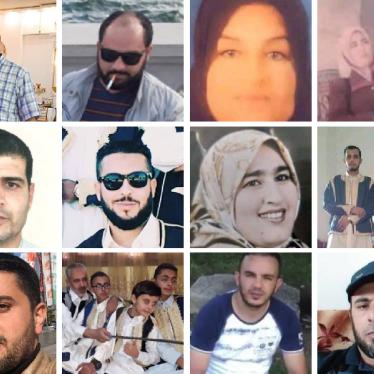(Beirut) – Justice remains elusive and impunity rampant a decade after the United Nations Security Council referred the situation in Libya to the International Criminal Court (ICC) prosecutor, Human Rights Watch said today.
Since 2011, multiple armed conflicts and political infighting have decimated Libya’s economy and public services and left the judiciary dysfunctional. Multiple armed groups backed by foreign supporters have killed, forcibly disappeared, and arbitrarily detained people, and displaced hundreds of thousands.
“After a decade of impunity for serious crimes, the wheels of justice set in motion by the Security Council’s referral of Libya to the ICC seem to have come to a grinding halt,” said Hanan Salah, senior Libya researcher at Human Rights Watch. “Council members need to ensure that the court has sufficient means and political backing to do its vital work on behalf of victims of grave abuses in Libya.”
On February 26, 2011, days after the start of the revolution that ousted Muammar Gaddafi, the Security Council unanimously adopted resolution 1970, giving the court a mandate over crimes against humanity, war crimes, and genocide committed in Libya since February 15, 2011. The ICC has issued arrest warrants against five individuals during its decade-long mandate.
The ICC faces steep challenges in carrying out its mandate in Libya. Without a police force, it relies on governments of countries where suspects can be found for cooperation in arrests, and that cooperation has been inadequate, Human Rights Watch said.
The three suspects implicated in the prosecutor’s current active cases remain at large. They include Saif al-Islam Gaddafi, a son of Muammar Gaddafi, for his alleged role in attacks on civilians during the country’s 2011 uprising, and Mahmoud al-Werfalli, commander of a special forces unit under the Libyan Arab Armed Forces, who is wanted for the murder of 33 people in seven incidents between 2016 and 2017 and another incident in 2018 when he allegedly shot 10 people. The third suspect is Al-Tuhamy Mohamed Khaled, a former head of the Internal Security Agency under Muammar Gaddafi. The ICC prosecutor has said that securing these arrests continues to be one of her office’s greatest challenges. The ICC also relies on government cooperation to further its investigations, including by facilitating evidence collection and preservation.
The situation in Libya remains deeply fractured as two authorities vie for control: the internationally recognized Tripoli-based Government of National Accord (GNA) in the west and the rival Interim Government in eastern Libya, which is affiliated with the armed group known as the Libyan Arab Armed Forces (LAAF), under the command of Khalifa Hiftar. The LAAF has received substantial military support from the United Arab Emirates, Jordan, Egypt, and Russia. Turkey is the main military backer of the GNA. According to the UN, 20,000 foreign fighters from Syria and elsewhere have supported these two entities.
In February 2021, the UN brokered the establishment of a new Government of National Unity among participants of the Libya Political Dialogue Forum (LPDF). This group of 75 individuals negotiated a governance framework and a roadmap for general elections, and on February 5 elected a three-member Presidency Council headed by Mohamed al-Mnefi with Abdelhamid Dabeiba as prime minister designate. Dabeiba has until February 26 to present his cabinet for confirmation by the parliament.
Over the past decade, Libyan authorities failed, or were unable, to investigate or prosecute those responsible for grave violations. Domestic courts, hampered by political divisions and episodes of armed conflict, are barely functional, characterized by grave due process violations, including forced confessions, ill treatment, and lack of access to lawyers. Lawyers, judges, and prosecutors have been targets of militias and risk retaliation for their work.
Systematic and widespread human rights violations, including forced displacement of tens of thousands of civilians, long-term arbitrary detention, and thousands of politically motivated assassinations, have been ongoing since 2011. During the latest armed conflict, between April 2019 and June 2020, armed groups from all sides were responsible for unlawful air and drone strikes, indiscriminate shelling, torture, unlawful executions and desecration of bodies, destruction of civilian structures, and use of prohibited cluster bombs and anti-personnel landmines and booby traps. Hundreds of residents from the town of Tarhouna remain missing after a local militia abducted and forcibly disappeared them.
The UN Security Council-mandated Sanctions Committee for Libya has listed only eight people for individual targeted sanctions – two militia commanders and six people involved in human trafficking.
The UN Human Rights Council on June 22, 2020 established a fact-finding body to investigate violations of international human rights law and international humanitarian law by all parties to the Libya conflict since the beginning of 2016. Due to budgetary constraints linked with the Covid-19 crisis, the mission has yet to deploy.
The ICC prosecutor reported in November 2020 that her office had conducted two missions to Libya in 2020 enabling her office to collect important evidence but did not give details about ongoing investigations.
The ICC’s member countries on February 12 elected a British lawyer, Karim Khan, as the new prosecutor of the court. In 2017 Khan was appointed Saif al-Islam Gaddafi’s counsel and represented him until 2018 in the context of litigation challenging the admissibility of Gaddafi’s case at the ICC.
As chief prosecutor, Khan will oversee the investigation and prosecution of serious crimes at a court that is struggling with its existing caseload, including due to inadequate resources. The court has 13 situations under investigation in addition to nine preliminary examinations – Khan’s term will begin in June 2021. In a move widely seen as an effort to thwart ICC investigations in Afghanistan and Palestine, the United States government in September 2020, under former president Donald Trump, imposed sanctions on the ICC prosecutor and another senior court official. Human Rights Watch has called on President Joe Biden to repeal ICC sanctions and work constructively with the court.
“Insufficient efforts to ensure accountability for past and ongoing serious crimes in Libya have only served to embolden those responsible for serious abuses,” Salah said. “An effective ICC backed by the strong support of the international community is needed more than ever to send the message that impunity for mass atrocities will not be tolerated.”
|
News Release
Libya: 10th Anniversary of Referral to ICC
Grim Decade for Human Rights
Your tax deductible gift can help stop human rights violations and save lives around the world.
Region / Country
Topic
Most Viewed
-
November 25, 2019
A Dirty Investment

-
June 3, 2025
“They’re Ruining People’s Lives”

-
December 21, 2023
Meta’s Broken Promises

-
December 11, 2018
No Support

-
December 4, 2020
“They’re Chasing Us Away from Sport”





